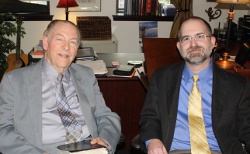[amazon 0825433673 thumbnail]
Last week I posted my review of Reading Revelation: A Comparison of Four Interpretive Translations of the Apocalypse, by C. Marvin Pate. This week Dr. Pate has agreed to answer some questions about his new book.
Dr. Pate teaches at Ouachita Baptist University in Arkadelphia, Arkansas where he is the Department Chair for Christian Theology and the Elma Cobb Professor of Christian Theology. Previous to teaching, Dr. Pate was a pastor at which time he earned his MA from Wheaton and his PhD from Marquette University.
Dr. Pate has spent a lifetime of writing books on eschatology some of which include: The End of the Age has Come: The Theology of Paul; Four Views on the Book of Revelation (contributor); Dictionary of Biblical Prophecy; End Times (contributor); and Doomsday Delusions: What’s Wrong with Predictions About the End of the World.
Share with us what started your interest in eschatology.
Two events drew me to eschatology, both of which occurred when I was 14 years old. First, on a hot July Monday evening in Hampton, Virginia (where I was raised) two U.S. fighter jets collided over the Atlantic Ocean in a practice maneuver and one crashed into the ocean but the other crashed one block from where I lived, in a crowded neighborhood. When it happened, the sky became red, the ground shook, and the noise was deafening. Not knowing what had happened, I thought Jesus was returning! That night made an indelible impression on me about the end of the world and the second coming of Christ. Second, I preached my first sermon at the age of 14, the same summer the jet crashed and my topic was—you guessed it—the second coming of Christ, based on Matthew 24. And so my interest began that summer and intensified in the years to come. I attended Moody Bible Institute as a student and embraced there dispensational pre-millennialism. But later at Wheaton Graduate School I embraced historical pre-millennialism and have pretty much held that position ever since; though technically I call my approach now “eclectic”.
 On Saturday, November 21, I attended what is something of a rarity these days—a prophecy conference. Dr. John Whitcomb spoke from the book of Daniel, focusing on the prophetic visions of Nebuchadnezzar and Daniel himself. I was there because I wanted to interview Dr. Whitcomb and the conference location was just a few hours from where I live. So the event itself wasn’t the main draw.
On Saturday, November 21, I attended what is something of a rarity these days—a prophecy conference. Dr. John Whitcomb spoke from the book of Daniel, focusing on the prophetic visions of Nebuchadnezzar and Daniel himself. I was there because I wanted to interview Dr. Whitcomb and the conference location was just a few hours from where I live. So the event itself wasn’t the main draw. Recently I sat down with Pastor Matt Morrell to discuss the challenges of being a young pastor, life in a pastor’s family, the state of Fundamentalism, the role of the Internet and blogs, and other topics. Matt is the new pastor of the historic
Recently I sat down with Pastor Matt Morrell to discuss the challenges of being a young pastor, life in a pastor’s family, the state of Fundamentalism, the role of the Internet and blogs, and other topics. Matt is the new pastor of the historic  Last time, we heard from Dr. A. Philip Brown, editor of A Reader’s Hebrew Bible (Zondervan, 2008). Now we hear from Dr. Bryan W. Smith, a close friend and collaborator with Phil Brown on this project.
Last time, we heard from Dr. A. Philip Brown, editor of A Reader’s Hebrew Bible (Zondervan, 2008). Now we hear from Dr. Bryan W. Smith, a close friend and collaborator with Phil Brown on this project.
Discussion